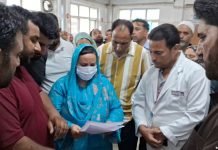
SRINAGAR — Jammu and Kashmir Union Territory has been identified as having the sixth highest prevalence of tobacco use in India, with over 20 per cent of the population engaging in tobacco consumption. The alarming statistics were highlighted by officials during ‘World No-Tobacco Day’ events aimed at raising awareness and promoting cessation.
Dr Mir Mushtaq, State Nodal Officer for the National Tobacco Control Programme (NTCP), reported that 20.8% of the J&K population smokes tobacco, ranking the region sixth nationally.
The Global Adult Tobacco Survey (GATS) 2 data reveals that 35.2% of men, 5.1% of women, and 20.8% of all adults in J&K smoke tobacco, with smokeless tobacco use at 4.3%, the lowest in the country. Overall, 39.7% of men, 6.2% of women, and 23.7% of all adults in the region either smoke or use smokeless tobacco.
Efforts to curb tobacco use have intensified, with thousands of challans issued and substantial fines collected over the past four years. Dr Mushtaq emphasized the importance of awareness programs, noting that informed individuals are more likely to quit smoking.
The government has declared all educational institutions and tourist destinations as tobacco-free zones and imposed a ban on the sale of loose cigarettes, bidis, and tobacco.
The National Family Health Survey (NHFS-5) data reveals that approximately 32% of men and 1% of women in J&K consume tobacco, with higher consumption rates in rural areas. A survey by Government Medical College (GMC) Srinagar found that 23% of school-going adolescents in Srinagar are smokers, with exposure to tobacco smoke in public places at 60.8%.
Director of the National Health Mission (NHM), Nazim Zia Khan, stressed the need for public commitment to quit smoking. “The government can facilitate efforts, but the public must choose to quit,” he said. He highlighted the role of parents, teachers, and media in educating youth about the dangers of tobacco use.
Director of Health Services Kashmir, Dr Mushtaq Ahmad Rather, linked smoking to increased drug abuse and highlighted the dangers of secondhand and thirdhand smoke. He called for a multi-pronged strategy to reduce cigarette consumption and its harmful effects.
Events across J&K, including walkathons, roadshows, and educational seminars, marked ‘World No-Tobacco Day’.
The Directorate of School Education Kashmir (DSEK) observed a ‘No Bag Day’ to engage students in activities promoting a smoke-free lifestyle and protecting youth from tobacco industry influences.
Follow Us
The Kashmir Pulse is now on Google News. Subscribe our Telegram channel and Follow our WhatsApp channel for timely news updates!










